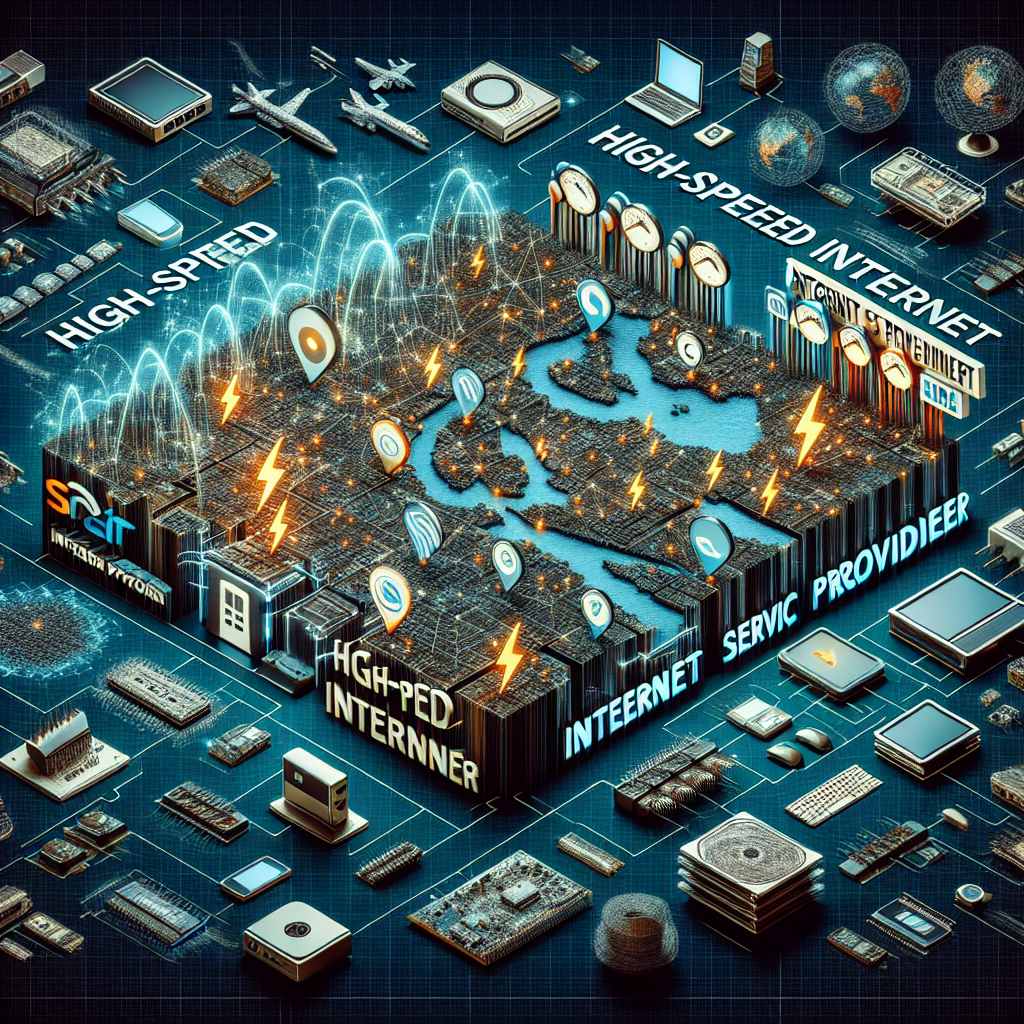Are you tired of dealing with slow internet speeds and constant buffering? Look no further! In this guide, we will unveil the top high-speed internet providers in your area, ensuring you get lightning-fast connections for all your online needs. From streaming HD movies to gaming with friends, these providers are guaranteed to deliver top-notch performance and reliability. Say goodbye to endless loading screens and hello to seamless browsing with the best high-speed internet providers right at your fingertips. Get ready to experience a whole new level of internet satisfaction like never before!
Understanding High-Speed Internet
What defines high-speed internet?
-
Bandwidth capacity: High-speed internet is characterized by its ability to deliver a large amount of data at fast speeds. Bandwidth capacity refers to the maximum rate at which data can be transferred through an internet connection. The higher the bandwidth capacity, the faster the internet speed.
-
Download and upload speeds: High-speed internet providers typically offer faster download and upload speeds compared to standard internet services. Download speed refers to how quickly data can be transferred from the internet to your device, while upload speed measures the rate at which data can be sent from your device to the internet.
-
Low latency: In addition to fast download and upload speeds, high-speed internet is characterized by low latency, which is the delay between a user’s action and the response from the internet. Low latency is crucial for activities such as online gaming, video conferencing, and real-time streaming.
-
Consistent performance: High-speed internet providers ensure consistent performance by minimizing fluctuations in internet speeds. Reliable internet connectivity is essential for uninterrupted online activities, such as streaming HD videos, downloading large files, and conducting video conferences.
-
Quality of service: High-speed internet providers prioritize quality of service to deliver fast and reliable internet connections to their customers. This includes offering technical support, service guarantees, and network maintenance to ensure optimal performance.
Factors to Consider When Choosing an Internet Provider
Coverage and Availability
- Importance of provider coverage in your area
Having access to high-speed internet is crucial in today’s digital age, and the first step in finding the best provider is determining their coverage in your area. The availability of internet providers can vary significantly depending on where you live. Some providers have extensive coverage in urban areas but may be limited in rural or remote locations. Therefore, understanding which providers offer services in your specific area is essential to ensure you can access the high-speed internet you need.
- How to check for available providers in your locality
To check for available internet providers in your area, you can start by visiting the websites of major providers and entering your address or zip code in their coverage maps. These maps will show you which providers offer services in your vicinity and the types of internet plans they have available. Additionally, you can use online tools and comparison websites that allow you to enter your address and receive a list of providers that serve your area. By researching and comparing the coverage and availability of different providers, you can make an informed decision on the best high-speed internet option for your location.
Speed and Bandwidth
Providers typically offer a range of speed options to cater to different needs and preferences. It is important to consider how you will be using the internet to determine the most suitable speed for your household. For example, if you frequently stream HD videos, engage in online gaming, or have multiple devices connected simultaneously, you may require a higher speed to ensure a seamless online experience.
Different speed options offered by providers:
- Some providers offer basic plans with speeds ranging from 25-50 Mbps, which are suitable for light internet users who primarily browse the web and check emails.
- Mid-tier plans generally range from 100-300 Mbps, offering faster speeds for households with moderate internet usage, such as streaming music and videos.
- High-tier plans can provide speeds of 500 Mbps or more, ideal for heavy internet users who engage in activities like 4K streaming, large file downloads, and online gaming.
Bandwidth requirements for typical internet usage:
- Bandwidth refers to the maximum rate at which data can be transferred over a network. Understanding your bandwidth requirements is crucial in selecting an internet plan that can support your online activities without experiencing lags or buffering.
- Streaming HD videos, especially on multiple devices simultaneously, requires higher bandwidth to ensure smooth playback without interruptions.
- Online gaming also demands low latency and high bandwidth to support real-time gameplay and minimize lag.
- For households with multiple users and devices connected to the internet at once, opting for a plan with sufficient bandwidth is essential to prevent slowdowns during peak usage times.
Reliability and Customer Service
- Importance of reliable internet connection
In today’s digital age, having a reliable internet connection is crucial for both personal and professional activities. From streaming movies and playing online games to attending virtual meetings and completing work tasks, a stable internet connection ensures uninterrupted access to online resources. Without reliability, users may experience frequent disconnections, slow speeds, and overall frustration in their online activities.
- How to assess a provider’s customer service quality
When evaluating an internet provider’s customer service quality, several factors should be considered. Firstly, look for reviews and ratings from current customers to gauge their satisfaction levels. Additionally, consider the provider’s response time to technical issues or outages, as prompt assistance can minimize downtime. Assess the availability of customer support channels such as phone, email, or live chat, as well as the competence and friendliness of their support staff. A reliable provider will offer 24/7 customer support to address any issues that may arise with your high-speed internet connection.
Comparison of Top High-Speed Internet Providers

Provider A
Comparison of Top High-Speed Internet Providers
-
Overview of services and packages offered
Provider A is a leading high-speed internet provider in the area, offering a wide range of services tailored to meet the needs of both residential and business customers. Their services include lightning-fast internet connections that allow for seamless streaming, gaming, and telecommuting. Additionally, Provider A offers robust security features to ensure a safe online experience for all users. -
Pricing plans and promotional offers
When it comes to pricing, Provider A stands out for its competitive rates and flexible plans. They offer a variety of packages to suit different budgets and usage requirements. Customers can choose from standalone internet plans or bundle options that include TV and phone services. Moreover, Provider A frequently runs promotional offers such as discounted rates for new subscribers or free installation for a limited time.
Provider B
- Services provided and technology used
Provider B offers high-speed internet services through a fiber-optic network infrastructure, ensuring reliable and fast internet connectivity. Their plans include speeds ranging from 100 Mbps to 1 Gbps, catering to the needs of both casual users and heavy streamers or gamers. Additionally, Provider B offers advanced Wi-Fi routers equipped with the latest technology to ensure seamless connectivity throughout your home or office space. Their internet packages often come bundled with additional benefits such as security software or cloud storage, enhancing the overall value for customers.
- Customer reviews and satisfaction ratings
Customer reviews of Provider B’s high-speed internet services are overwhelmingly positive, with many praising the consistency and speed of their connections. In satisfaction surveys, customers frequently highlight the reliability of Provider B’s network, noting minimal downtime or service disruptions. The customer service provided by Provider B also receives high ratings, with users appreciating the prompt and effective assistance received when troubleshooting issues or upgrading their plans. Overall, Provider B stands out as a top choice for those seeking high-speed internet in the area, based on the positive feedback and satisfaction expressed by its customers.
Provider C
- Unique features and benefits of choosing this provider
Provider C stands out in the market due to its lightning-fast internet speeds, making it an ideal choice for households with multiple devices and high bandwidth needs. The provider offers a range of packages tailored to different usage requirements, ensuring that customers can select the plan best suited to their needs. Additionally, Provider C boasts exceptional reliability and consistent performance, minimizing interruptions during peak usage times. Customers can also benefit from top-tier customer service, with knowledgeable representatives available to address any queries or concerns promptly.
- Installation process and equipment included
The installation process with Provider C is seamless and efficient, with professional technicians ensuring that the setup is completed swiftly and accurately. Customers can schedule a convenient installation time, and the technicians will arrive equipped with all the necessary tools and equipment to get the internet up and running in no time. Additionally, Provider C includes all essential equipment as part of the package, eliminating the need for customers to purchase additional hardware separately. This includes high-quality modems, routers, and any other components required to optimize the internet connection for a smooth and hassle-free experience.

User Experience and Feedback
Real-life experiences with different providers
User Experience and Feedback
When it comes to high-speed internet providers, user experiences can vary widely depending on the region and specific provider. Here are some real-life experiences shared by customers in different areas:
Provider A
- Customer in City X: “I’ve been a subscriber to Provider A for over a year now, and I have to say I’m impressed with the consistency of their high-speed internet. I rarely experience any downtime, and their customer service has been responsive whenever I’ve had an issue.”
- Customer in City Y: “I switched to Provider A recently, and I’ve noticed a significant improvement in my internet speeds compared to my previous provider. The installation process was smooth, and I haven’t encountered any major issues so far.”
Provider B
- Customer in City Z: “I’ve had a frustrating experience with Provider B. Despite their claims of high-speed internet, I frequently experience slowdowns during peak hours, which can be incredibly frustrating when I’m trying to work from home. Their customer service has been unhelpful in addressing this issue, leaving me considering switching to a different provider.”
Provider C

– Customer in City W: “Provider C has been a reliable choice for me. Their high-speed internet has been consistent, and I appreciate the variety of packages they offer to suit different needs. The few times I’ve had to contact customer service, they were prompt in resolving my queries, making me a satisfied customer.”
Tips for Optimizing Your High-Speed Internet Connection
Wi-Fi Setup and Placement
Tips for Optimizing Your High-Speed Internet Connection
- Importance of Router Placement for Optimal Signal Strength
- Placing the router in a centralized location within your home can help distribute the signal evenly throughout the space.
- Avoid placing the router near large appliances or objects that may interfere with the signal, such as microwaves or metal surfaces.
-
Elevating the router off the ground and positioning it at eye level can also improve signal coverage.
-
Ensuring Secure and Efficient Wi-Fi Network
- Set up a strong password for your Wi-Fi network to prevent unauthorized access and ensure the security of your connection.
- Regularly update your router’s firmware to protect against vulnerabilities and maintain optimal performance.
- Consider enabling network encryption, such as WPA2, to add an extra layer of security to your Wi-Fi network.
Regular Speed Tests and Troubleshooting
for Optimizing Your High-Speed Internet Connection
Regularly conducting speed tests and troubleshooting common connectivity issues are essential steps to ensure that you are getting the most out of your high-speed internet connection.
- How to conduct speed tests to monitor internet performance
- Conducting speed tests can help you determine if your internet service provider is delivering the promised speeds. You can easily perform a speed test by visiting websites such as Ookla’s Speedtest or Google’s Internet Speed Test. Simply click the “Start Test” button, and the website will measure your current download and upload speeds.
-
Make sure to conduct speed tests at different times of the day to get a comprehensive understanding of your internet performance. Factors such as network congestion and peak usage times can impact your speeds.
-
Troubleshooting common connectivity issues
- If you are experiencing slow internet speeds, start by checking your hardware. Ensure that your modem and router are functioning properly and are up to date. Sometimes a simple reset of these devices can significantly improve your connection.
- Check for any background processes or devices that may be hogging bandwidth. Streaming services, downloads, or multiple devices using the internet simultaneously can cause a strain on your connection.
- If the issue persists, contact your internet service provider to see if there are any known outages or technical issues in your area. They may be able to provide further assistance or send a technician to investigate the problem.
Choosing the Best High-Speed Internet Provider for Your Needs
When it comes to selecting the best high-speed internet provider for your specific requirements, there are several crucial factors to take into consideration. Here are some key points to keep in mind:
-
Internet Speed Options: One of the primary factors to consider is the range of internet speed options offered by the providers. Determine your usage needs, whether it’s basic browsing, streaming, gaming, or working from home, and choose a provider that can meet those requirements with their speed offerings.
-
Reliability and Uptime: A reliable internet connection is essential, especially if you rely on the internet for work or entertainment. Look for providers with a reputation for minimal downtime and consistent service quality.
-
Customer Support: In the event of any issues or technical difficulties, responsive and efficient customer support can make a significant difference. Consider reading reviews or asking for recommendations to gauge the level of customer service provided by each internet provider.
-
Contract Terms and Pricing: Evaluate the contract terms, pricing structure, and any hidden fees associated with the internet service. Compare the costs of installation, equipment rental, monthly service fees, and any additional charges to ensure you are getting the best value for your money.
-
Availability and Coverage: Check the availability of each high-speed internet provider in your area to determine which options are accessible to you. Some providers may offer coverage in specific regions or neighborhoods, so confirm that your location is within their service area before making a decision.
-
Additional Features and Bundling Options: Some internet providers offer additional features such as Wi-Fi hotspots, security services, or the option to bundle internet with TV or phone services. Assess whether these extras align with your preferences and needs to make the most informed choice.
FAQs: Best High-Speed Internet Providers in My Area
How do I know who the best high-speed internet providers are in my area?
To determine who the best high-speed internet providers are in your area, you can start by researching online or asking for recommendations from friends and family who live nearby. You can also use internet comparison websites that allow you to enter your address and see which providers are available in your location. Additionally, you can contact the providers directly and inquire about their internet packages and speeds in your area.
What factors should I consider when deciding on a high-speed internet provider?
When choosing a high-speed internet provider, there are several factors you should consider. Some of these include the speed and reliability of the internet connection, the cost of the service, any data caps or restrictions, customer service and support availability, and additional features such as included equipment or bundle deals. It’s important to weigh these factors carefully and choose a provider that best meets your specific needs and requirements.
Are there any specific high-speed internet providers that are known for their quality service?
While the best high-speed internet provider can vary depending on your location, there are some providers that are consistently known for their quality service nationwide. Some of these top providers include Xfinity, AT&T, Spectrum, Verizon Fios, and CenturyLink. These providers typically offer a range of internet packages with varying speeds and prices to suit different customer preferences.
How can I ensure that I am getting the best deal on high-speed internet in my area?
To ensure that you are getting the best deal on high-speed internet in your area, it’s important to compare prices and packages from multiple providers. You can also inquire about any promotional offers or discounts that may be available, as well as negotiate with the provider for a better deal. Additionally, consider bundling services such as internet and cable or internet and phone to potentially save money on your monthly bill.
